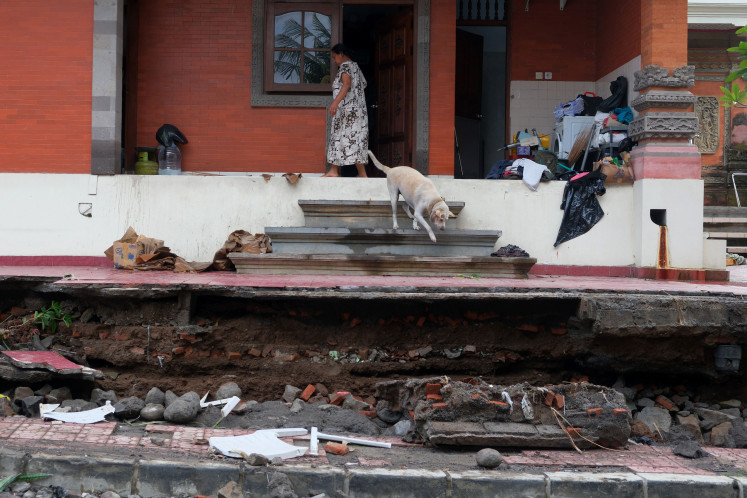Popular Reads
Top Results
Can't find what you're looking for?
View all search resultsPopular Reads
Top Results
Can't find what you're looking for?
View all search resultsCollege students rely on pirated books for studying
Arfany, a 17-year-old freshman in history at Jakarta State University (UNJ), was chatting with four friends while waiting for some books to be wrapped at Senen Market in Central Jakarta on Wednesday afternoon
Change text size
Gift Premium Articles
to Anyone
A
rfany, a 17-year-old freshman in history at Jakarta State University (UNJ), was chatting with four friends while waiting for some books to be wrapped at Senen Market in Central Jakarta on Wednesday afternoon.
'We need to wait for the bookstore owner to collect them from the storeroom,' she said, adding that she and her friends had purchased 19 copies.
Arfany said many of her college mates ordered the same kind of books because they were so much cheaper.
'We pay only Rp 25,000 [US$2.10] per copy,' she said, adding that the price of the same book in mainstream bookstores could be up to Rp 80,000.
Arfany said she knew the books were pirated. 'However, the price difference is massive and college students like me prefer to use the money for other stuff,' she said.
'However, I still buy novels or magazines in major bookstores like Gramedia and Gunung Agung,'
she said.
Many college students in Jakarta rely on pirated books to support their studies. Although the quality of the books is poorer, they are far cheaper than the originals.
The same strategy is also employed by 25-year-old math student Nova Ridha Sianturi and her friends at the Christian University of Indonesia (UKI).
'The difference can be more than Rp 50,000,' she said, while haggling over the price of some math
textbooks.
Nova said she bought pirated books to cut down on her expenses. 'We need to buy at least one title for each subject, and I'm taking nine subjects this semester,' she said.
'By buying pirated books, I only spend around Rp 200,000 [per semester],' she said.
A bookseller in Senen Market, 44-year-old Kardi, said a great many college students and even lecturers bought pirated books, referred to locally as KW or BJ books.
'However, we also sell the original titles, although people rarely want them,' he said.
- Students say massive difference in price makes them buy pirated books
- Police sometimes raid pirated-book vendors, but often to no avail
- Publishers association says book piracy hampers development of university publishers
Kardi said although the covers of the books were the same, it was easy to recognize pirated ones. 'The text is usually a little blurry and the pictures inside are only black and white,' he said.
He added that selling pirated books was quite dangerous, as publishers and the police often raided the market's bookstores.
One bookseller who refused to be named said he was once caught during a raid. 'They confiscated the pirated books, worth around Rp 500,000, and detained me at the police precinct,' he said.
He said he was finally released two days later after paying a fine of Rp 2.5 million.
The chairman of the Jakarta chapter of the Association of Indonesian Publishers (IKAPI), Hikmat Kurnia, said the prevalence of pirated books hampered the development of university publishers.
'Most of the titles that are pirated are textbooks. Therefore, publishers who print these books usually can't generate much income,' he said.
According to Hikmat, IKAPI often conducts raids to reduce the distribution of pirated books, but he admitted such efforts were useless.
'Raiding book stalls is expensive, and the police cannot initiate the measure because piracy is only considered a crime if someone reports it to the police,' he said, adding, however, that he understood the reason for piracy was due to the expense of original textbooks.
'Publishers have to spend money on royalties, pre-production preparations and other components, while the pirates only have printing costs,' Hikmat said.
He said some publishers even pirated their own books in order to stop other pirated versions of their titles from being circulated.










